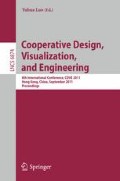Abstract
An increasing concern about urban environmental quality has grown in the last decades caused by urban production mechanisms. Now, policies and ICT models need to integrate traditional quantitative techniques with more complex multiagent tools to support effective recovery strategies.
Basing on a hybrid scenario approach, the present research links information and knowledge aspects to define sequences of events and processes for decisionmaking. An ICT-based model is set up, involving human agents, low-profile artificial (routinary) agents and/or high profile (intelligent) agents, as defined by computer-science and multi-agent studies.
Particularly, the paper focuses on the case study of Bari, Italy, addressing multi-agent-based relationships between urban microclimatic and social characters.
The present study has been carried out by the authors as a joint research work. Nonetheless, section 3 has been written by D. Borri, sections 1 and 2 have been written by D. Camarda.
Access this chapter
Tax calculation will be finalised at checkout
Purchases are for personal use only
Preview
Unable to display preview. Download preview PDF.
References
Lin, C.-J., Ho, T.C., Chu, H.-w., Yang, H., Mojica, M.J., Krishnarajanagar, N., Chiou, P., Hopper, J.R.: A Comparative Study of US EPA 1996 and 1999 Emission Inventories in the West Gulf of Mexico Coast Region, USA. Journal of Environmental Management 75, 303–313 (2005)
Reible, D.D.: Fundamentals of Environmental Engineering. Lewis-Springer, Boca Raton, FL, USA (1999)
Newman, P., Jennings, J.: Cities as Sustainable Ecosystems. Island Press, Melbourne (2008)
Ferber, J.: Multi-Agent Systems: An Introduction to Distributed Artificial Intelligence. Addison-Wesley, London (1999)
Lindgren, M., Bandhold, H.: Scenario Planning: The Link Between Future and Strategy. Palgrave Macmillan, London (2003)
Camarda, D.: Beyond citizen participation in planning: Multi-agent systems for complex decision making. In: Nunes Silva, C. (ed.) Handbook of Research on E-planning: ICTs for Urban Development and Monitoring, pp. 195–217. IGI Global, Hershey (2010)
Ben Youssef, A., Lahmandi-Ayed, R.: Eco-labelling, competition and environment: Endogenization of labelling criteria. Environmental and Resource Economics 41, 133–154 (2008)
Brenner, M., Nebel, B.: Continual Planning and Acting in Dynamic Multiagent Environments, vol. 19. Springer, US (2009)
Kalapanidas, E., Avouris, N.: Air quality management using a multi-agent system. Computer-Aided Civil and Infrastructure Engineering 17, 119–130 (2002)
Bruse, M.: Simulating human thermal comfort and resulting usage patterns of urban open spaces with a multi-agent system. In: 24th International Conference on Passive and Low Energy Architecture (PLEA), Singapore, pp. 699–706 (2007)
Tanimoto, J., Hagishima, A., Sagara, H.: A methodology for peak energy requirement considering actual variation of occupants’ behavior schedules. Building and Environment 43, 610–619 (2008)
Dastani, M., van Riemsdijk, B., Hulstijn, J., Dignum, F., Meyer, J.-J.: Enacting and Deacting Roles in Agent Programming. In: Odell, J.J., Giorgini, P., Müller, J.P. (eds.) AOSE 2004. LNCS, vol. 3382, pp. 189–204. Springer, Heidelberg (2005)
Ciliberti, T., Terrico, D., Terrone, A.: Rilievo Satellitare delle Temperature nella Città di Bari. Academic training report, ECOURB - Politecnico di Bari (2011)
Anderson, L.W., Krathwohl, J. (eds.): A Taxonomy for Learning, Teaching, and Assessing: A Revision of Bloom’s Taxonomy of Educational Objectives. Longman, New York (2001)
Brancolini, A., Buttazzo, G.: Optimal networks for mass transportation problems. ESAIM: Control, Optimisation and Calculus of Variations 11, 88–101 (2005)
Borri, D., Camarda, D.: Spatial ontologies in multi-agent environmental planning. In: Yearwood, J., Stranieri, A. (eds.) Technologies for Supporting Reasoning Communities and Collaborative Decision Making: Cooperative Approaches, pp. 272–295. IGI Global Information Science, Hershey (2011)
Simon, H.A.: Models of Bounded Rationality. The MIT Press, Cambridge (1982)
Borri, D., Concilio, G., Selicato, F., Torre, C.: Ethical and moral reasoning and dilemmas in evaluation processes: Perspectives for intelligent agents. In: Miller, D., Patassini, D. (eds.) Beyond Benefit-Cost Analysis: Accounting for Non-Market Values in Planning Evolution, pp. 249–277. Brookfield, Ashgate (2005)
Minsky, M.L.: The Emotion Machine: Commonsense Thinking, Artificial Intelligence, and the Future of the Human Mind. Simon and Schuster, New York (2006)
Author information
Authors and Affiliations
Editor information
Editors and Affiliations
Rights and permissions
Copyright information
© 2011 Springer-Verlag Berlin Heidelberg
About this paper
Cite this paper
Borri, D., Camarda, D. (2011). Planning for the Environmental Quality of Urban Microclimate: A Multiagent-Based Approach. In: Luo, Y. (eds) Cooperative Design, Visualization, and Engineering. CDVE 2011. Lecture Notes in Computer Science, vol 6874. Springer, Berlin, Heidelberg. https://doi.org/10.1007/978-3-642-23734-8_21
Download citation
DOI: https://doi.org/10.1007/978-3-642-23734-8_21
Publisher Name: Springer, Berlin, Heidelberg
Print ISBN: 978-3-642-23733-1
Online ISBN: 978-3-642-23734-8
eBook Packages: Computer ScienceComputer Science (R0)

